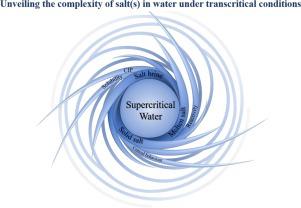The Journal of Supercritical Fluids ( IF 3.4 ) Pub Date : 2020-06-30 , DOI: 10.1016/j.supflu.2020.104977 Elen Duverger-Nédellec , Thomas Voisin , Arnaud Erriguible , Cyril Aymonier

|
Processes using water at sub- and supercritical conditions (T > 300 °C) are used in industrial wastewater treatment, chemical recycling of wastes, biomass conversion and also in material synthesis, because of their rapidity and high efficiency. However, the salts injected or generated during the processes can lead to complex multiphasic water-salts systems with a behavior far to be understood in all the cases. Drastic changes of physics and chemistry of the systems are expected from water intrinsic properties; however, the formation of new phases, sometimes unexpected, near the critical point of water (374 °C; 22.1 MPa) also has a direct effect on the properties of the system. It is thus important to be conscious of the existence of these new phases to have the best control as possible on the physico-chemistry occurring inside the reactor. The aim of this review paper is to give an overview of these poorly-known new phases and to show that they are more encountered in SCW than it is thought.
中文翻译:

揭示跨临界条件下水中盐的复杂性
在亚临界和超临界条件下(T> 300°C)使用水的过程因其快速高效而被用于工业废水处理,废物的化学回收,生物质转化以及材料合成。但是,在处理过程中注入或生成的盐会导致复杂的多相水盐系统,其行为在所有情况下都难以理解。从水的内在特性可以预料到系统的物理和化学的巨大变化。但是,在水的临界点(374°C; 22.1 MPa)附近形成新的相,有时是出乎意料的,也直接影响系统的性能。因此,重要的是要意识到这些新相的存在,以便对反应器内部发生的物理化学进行最佳控制。











































 京公网安备 11010802027423号
京公网安备 11010802027423号